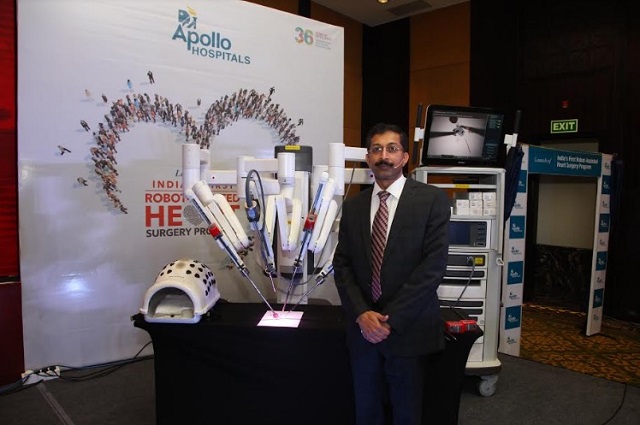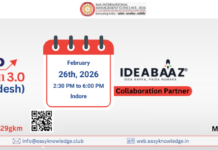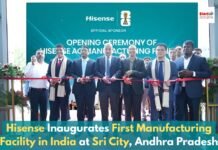Dec 20, 2019: Bangalore, Karnataka, India: Apollo Hospitals Bangalore, one of the most advanced multi-speciality tertiary care hospitals in the city and part of the Apollo Hospitals Group (BSE: 508869 / NSE: APOLLOHOSP) today announced the launch of the first dedicated Robot-Assisted Cardiac Surgery Unit in India. A milestone in the history of cardiovascular surgery in the country, the Robot-Assisted Cardiac Surgery Unit will offer patients with complex cardiac disease treatment with robotic assisted minimally invasive cardiac surgery. The Robot-Assisted Cardiac Surgery Unit will be equipped with the advanced fourth-generation versatile ‘da Vinci Xi’ robotic surgical system and a dedicated team, led by Dr. Sathyaki P Nambala, Sr. Consultant, Cardiac Thoracic and Vascular Surgeon and HoD, Robotic Cardiac Surgery Unit.

Dr. K. Hariprasad, President, Apollo Hospitals said, “Our vision has always been to bring the most advanced medical technology to India to benefit our patients. We are continuing on this path with the launch of the dedicated Robot-Assisted Cardiac Surgery Unit, which will be the first in India to offer a full-time robotic heart surgery program. This will empower our doctors to deliver the best of cardiac care, armed with the latest in advanced medical technology. At Apollo Hospitals, the patient is at the center of all our efforts in providing accessible and affordable world-class treatment, and the introduction of the da Vinci Xi robotic surgical system is in furtherance of this objective. With 18 cases successfully treated to date with robot-assisted cardiac surgery, we are confident that the dedicated unit will change the lives of many more patients who cannot undergo conventional cardiac surgery.”
Dr. Sathyaki P Nambala, Sr. Consultant, Cardiac Thoracic and Vascular Surgeon and HoD, Robotic Cardiac Surgery Unit said, “The development of a Robot-Assisted Cardiac Surgery program requires a tremendous amount of dedication and preparation, and we are proud to have launched a dedicated program for the first time in India.”
The innovative technology of the da Vinci Xi allows complex cardiovascular surgeries to be performed through smaller incisions and precise motion control, as compared to conventional open heart surgery, which involves opening up the chest by splitting the breastplate. The robot is docked near the operation table while the cardiac surgeon sits on a console from where commands are given to operate the smooth and dexterous robotic arms with a precision that would be impossible without the robot. A high-definition camera provides a clear, 3D view of the chest to the surgeon on a console screen.
Davison PK, CEO, Apollo Hospitals, Bangalore said, “The Robot-Assisted Cardiac Surgery Program will now be accessible to patients, not just across the nation, but the world too, thus making India a one-stop destination for robotic surgery. One of the major features of the specialized unit lies is that it will help reduce strain on the surgeon, by providing excellent vision, along with an increase in comfort while performing long surgeries. Very few centers in the globe offer this service, and we are proud that Apollo Hospitals Bangalore will be the first in India.”
Dr. Nambala added, “Robotic heart surgery means minimal trauma, less blood loss and less overall discomfort for the patient. Since no bones are cut, there is no instability of the breast-bone or sternum after the surgery. Small incisions lead to negligible blood loss, eliminating blood transfusion in most cases and eliminating risks of blood borne infection. Other advantages include reduced pain, less post-operative wound infections, less post-operative scarring, and a positive effect on breathing. Recovery is rapid, with lesser hospitalization, faster mobilization and rehabilitation. Healing is usually complete in 10 days with return to normal life including driving or other activities within a few days. The reduction in chance of infection makes it an ideal procedure ideal in diabetics and older patients.”
About da Vinci Xi Robotic Surgical System
The da Vinci Xi Robotic Surgical System was approved by the USFDA in 2014. It operates on three principals: first, the surgeon can plan and visualize the surgery beforehand to study multiple levels and the entire process; second, the robotic guidance system will be an extension of the doctor during the process and is intended to enable execution with precision; and third, the doctor can visualize progress in real-time. The da Vinci Xi consists of three main components: a robot, acting as remote manipulator, a control console, used by the surgeon, and an endoscopic vision cart. The da Vinci Xi provides high resolution 3D visualization, up to ten-times magnification of the operating field, movement scaling, and dual console systems for surgeon cooperation and training.






